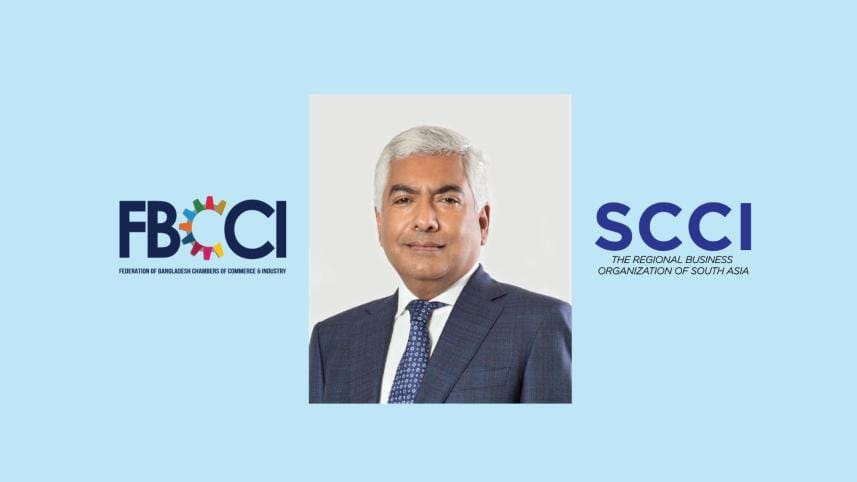US tariffs offer big opportunity for Saarc trade

Donald Trump's reciprocal tariffs can turn into the biggest opportunity for boosting trade among Saarc nations as many countries have adopted protectionism in response to the tariffs, said Saarc Chamber President Md Jashim Uddin yesterday.
Many countries are now turning to protectionism in response to US tariffs, breaking up traditional trade routes. "For South Asia, this is not just a challenge; it is our biggest opportunity," said Jashim.
"But first, let us be concerned about our reality. Our intra-regional trade stands at a mere $38.7 billion. That is just 8 percent of our total exports and represents lost potential," he said.
In comparison, with Asean it is 22 percent, or with the European Union 45 percent, he said.
"Our FDI figures show a positive trend but are still growing only to a million figure. We must aim for billions, not millions," Jashim said at a conference on "Advancing Global and Regional Trade & Investment."
The event was organised by the Saarc Chamber of Commerce and Industry in collaboration with the Federation of Bangladesh Chambers of Commerce and Industry (FBCCI) at The Westin in Dhaka.
The leaders of business chambers and trade bodies, economists, trade analysts, exporters, importers, and traders from Bangladesh and other Saarc countries participated in the conference.
Global politics and economics are shifting and facing serious challenges, he said.
Supply chains are being restructured. Growth is slow, the recovery is weak, and the future is uncertain. Wars in Ukraine and the Middle East have caused problems for energy and food supplies around the world, he said.
"We need to identify the reasons. Why is this happening? This is not just because of tariffs. It is the invisible walls we have built between ourselves," Jashim also said.
"The world is looking for 'China Plus One'. They want new, reliable manufacturing hubs. South Asia, with its nearly $5 trillion economy, 2 billion people, mostly young workforce, and strategic location, offers immense potential and would be the perfect choice," he said.
Bhavesh R Trivedi, director of the Saarc Secretariat, said a geopolitical realignment has been taking place in the world and is also bringing a shift in the economic paradigm.
The geopolitical crisis is creating uncertainty and challenges for South Asian regional trade, he said. He urged more cooperation in using roads and railways, simplifying customs procedures, and harmonising standards.
South Asia is home to more than 1.8 billion people and is one of the most dynamic and diverse regions in the world, he said.
Of the Saarc members' total external trade, Bhutan and Nepal are the most dependent on Saarc trade, according to a study shared by Fahmida Khatun, executive director of the Centre for Policy Dialogue.
Two critical drivers, including geopolitical volatility and regulatory stringency, are shaping the future of global competitiveness in trade, investment, alliances, multilateralism, balancing growth, protection, innovation, consumer trust, and sustainability.
Bangladeshi exporters have been facing a lot of difficulties in the shipment of goods to India, and the trade should be looked at in a positive way although there are political differences among the leaders, said Showkat Aziz Russell, president of the Bangladesh Textile Mills Association.
Atif Ikram Sheikh, president of the Federation of Pakistan Chambers of Commerce and Industry, and Anwar-Ul-Alam Chowdhury (Parvez), president of the Bangladesh Chamber of Industries, also spoke.



 For all latest news, follow The Daily Star's Google News channel.
For all latest news, follow The Daily Star's Google News channel.
Comments